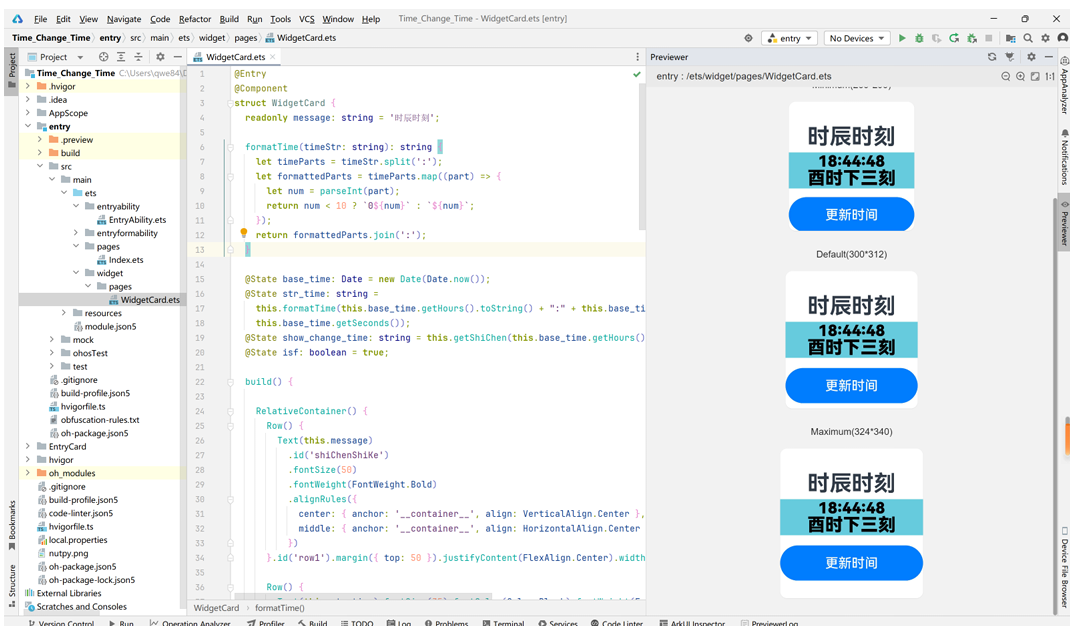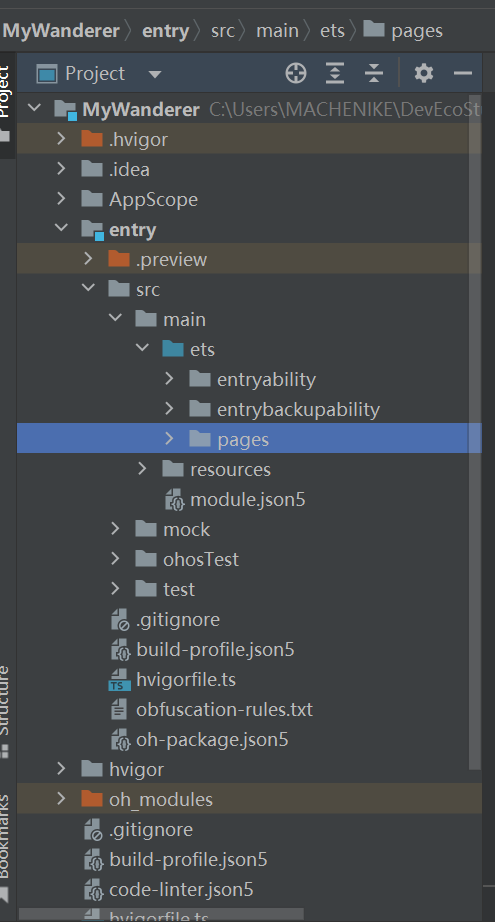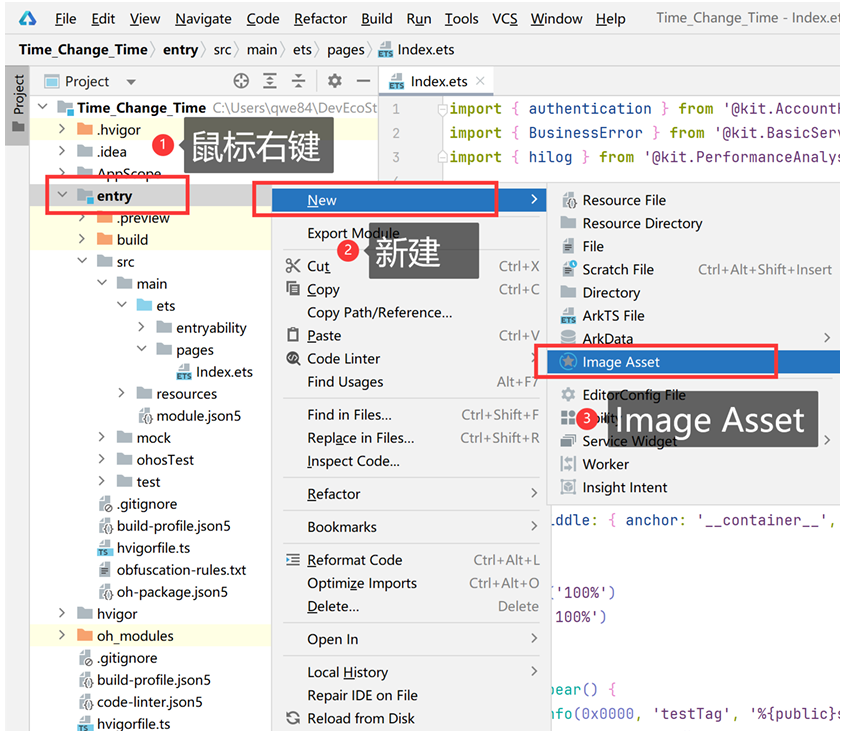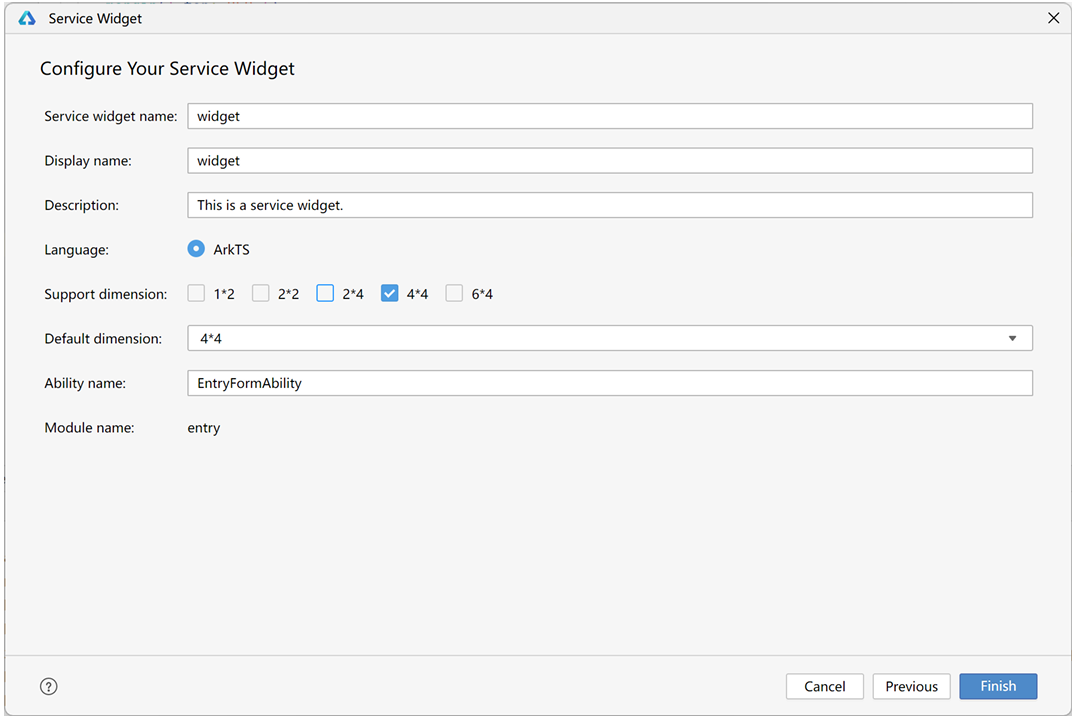元服务——介绍及环境搭建
一、什么是元服务
元服务(Meta Service)是一种依托HarmonyOS系统实现的轻量化、无需下载安装即可使用的服务形式,比传统的应用程序更加简便,主要特点包括:
- 轻量化:用户不需要下载完整的应用程序,而是可以直接通过系统访问所需的服务,使用完毕后即可关闭,不会占用设备内存
- 快速访问:元服务通常以卡片的形式呈现,可以通过桌面、搜索结果、消息通知等多种入口快速访问。
- 个性化定制:用户可以根据个人需求自由组合不同的元服务卡片,实现个性化的服务组合。
- 跨平台支持:基于HarmonyOS API开发的元服务支持在多种设备上运行,包括但不限于手机、平板、智能手表等,实现了服务的一次开发、多端运行。
- 高效开发:元服务的开发周期较短,成本效益高,有利于促进开发者生态的繁荣发展。
二、DevEco Studio环境与示例
1、安装DevEco Studio
https://developer.huawei.com/consumer/cn/download/
2、创建元服务项目
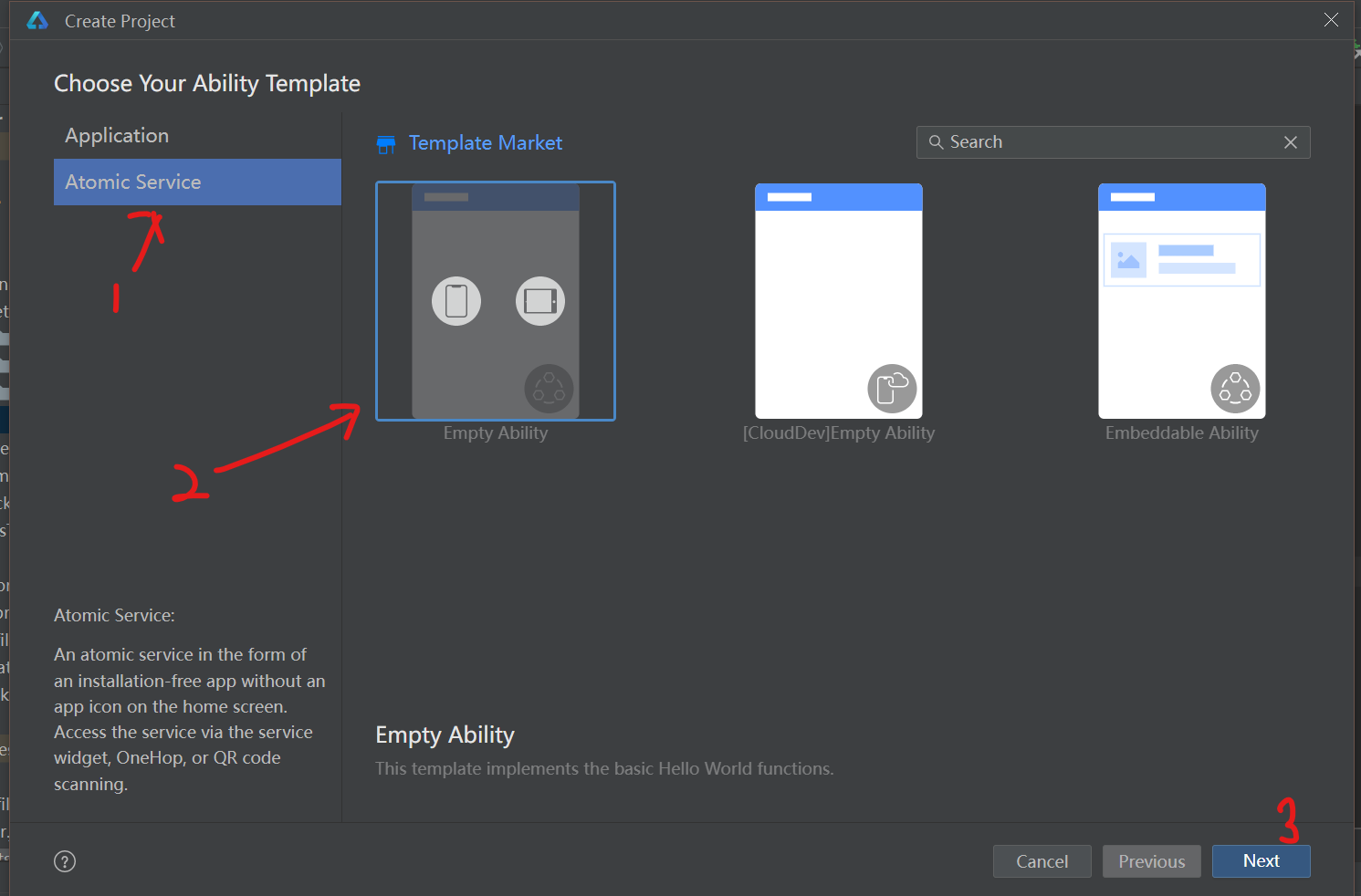 需使用华为账号登录 成为开发者: https://id1.cloud.huawei.com/CAS/portal/loginAuth.html
需使用华为账号登录 成为开发者: https://id1.cloud.huawei.com/CAS/portal/loginAuth.html
创建一个“Register App ID” 
-
AppScope > app.json5:元服务的全局配置信息。
-
entry :HarmonyOS工程模块,编译构建生成一个HAP。
-
src > main > ets:用于存放ArkTS源码。
-
rc > main > ets > entryability:元服务的入口。 -
-
src > main > ets > pages:元服务包含的页面。 -
-
src > main > resources:用于存放元服务所用到的资源文件,如图形、多媒体、字符串、布局文件等。关于资源文件, -
-
src > main > module.json5:模块配置文件。主要包含HAP的配置信息、元服务在具体设备上的配置信息以及元服务的全局配置信息。
-
build-profile.json5:当前的模块信息 、编译信息配置项,包括buildOption、targets配置等。
-
hvigorfile.ts:模块级编译构建任务脚本,开发者可以自定义相关任务和代码实现。
-
oh_modules:用于存放三方库依赖信息。
-
build-profile.json5:元服务级配置信息,包括签名signingConfigs、产品配置products等。
-
hvigorfile.ts:元服务级编译构建任务脚本
3、生成元服务图标
- 图标格式:.png、.jpeg、.jpg格式的静态图片资源
- 图标尺寸:1024 x 1024 px (正方形)
- 图标背景:不透明
- 质量要求:图标内容需清晰可辨,避免存在模糊、锯齿、拉伸等问题。
- Color:推荐使用的图标颜色。选择不同颜色,右边图标预览区域可查看相应的效果。
- Name:生成的图标名称。
- Res Directory:生成的512px*512px尺寸图标在工程中的保存位置。
- Save to:生成的216px*216px尺寸图标需要指定本地文件夹的保存位置。后续在AppGallery Connect上架元服务时,需使用该图标。
注:上传图片后在相应模块目录src > main > resources > base > media路径下生成元服务图标。 可在模块级module.json5中的icon字段中配置元服务图标。
4、构建元服务的第一个页面
默认为相对布局的代码,布局的方式有很多种。 线性布局 (Row/Column),层叠布局 (Stack),弹性布局 (Flex),相对布局 (RelativeContainer),栅格布局 (GridRow/GridCol),媒体查询 (@ohos.mediaquery),创建列表 (List),创建网格 (Grid/GridItem), 创建轮播 (Swiper),选项卡 (Tabs)。
这里我们先来看相对布局: RelativeContainer为采用相对布局的容器,支持容器内部的子元素设置相对位置关系,适用于界面复杂场景的情况,对多个子组件进行对齐和排列。子元素支持指定兄弟元素作为锚点,也支持指定父容器作为锚点,基于锚点做相对位置布局。
基本概念 锚点:通过锚点设置当前元素基于哪个元素确定位置。 对齐方式:通过对齐方式,设置当前元素是基于锚点的上中下对齐,还是基于锚点的左中右对齐。
锚点设置是指设置子元素相对于父元素或兄弟元素的位置依赖关系。在水平方向上,可以设置left、middle、right的锚点。在竖直方向上,可以设置top、center、bottom的锚点。
为了明确定义锚点,必须为RelativeContainer及其子元素设置ID,用于指定锚点信息。ID默认为“container”,其余子元素的ID通过id属性设置。不设置id的组件能显示,但是不能被其他子组件作为锚点,相对布局容器会为其拼接id,此id的规律无法被应用感知。互相依赖,环形依赖时容器内子组件全部不绘制。同方向上两个以上位置设置锚点,但锚点位置逆序时此子组件大小为0,即不绘制。
示例代码(ets/pages/index.ts)
import { authentication } from '@kit.AccountKit';
import { BusinessError } from '@kit.BasicServicesKit';
import { hilog } from '@kit.PerformanceAnalysisKit';
/**
* @author 坚果派·红目香薰
* @date 2024年11月5日13:58:20
*/
@Entry
@Component
struct Index {
@State message: string = '时辰时刻';
@State base_time: Date = new Date(Date.now());
@State str_time: string =
this.formatTime(this.base_time.getHours().toString() + ":" +
this.base_time.getMinutes() + ":" + this.base_time.getSeconds());
@State show_change_time: string =
this.getShiChen(this.base_time.getHours(),this.base_time.getMinutes());
@State isf : boolean = true;
build() {
RelativeContainer() {
Row() {
Text(this.message)
.id('shiChenShiKe')
.fontSize(50)
.fontWeight(FontWeight.Bold)
.alignRules({
center: { anchor: '__container__', align: VerticalAlign.Center },
middle: { anchor: '__container__', align: HorizontalAlign.Center }
})
}.id('row1').margin({ top: 50
}).justifyContent(FlexAlign.Center).width('100%')
Row() {
Text(this.str_time).fontSize(35).fontColor(Color.Black).fontWeight(FontWeight.Bo
lder)
}
.backgroundColor('#66CCDD')
.id('row2')
.margin({ top: 150 })
.justifyContent(FlexAlign.Center)
.width('100%')
Row() {
Text(this.show_change_time).fontSize(40).fontColor(Color.Black).fontWeight(FontW
eight.Bolder)
}
.backgroundColor('#66CCDD')
.id('row3')
.margin({ top: 250 })
.justifyContent(FlexAlign.Center)
.width('100%')
Row() {
Button('开启时时模式').size({ width: 250, height: 80
}).fontSize(30).onClick(() => {
if(this.isf){
this.isf = false;
setInterval(()=>{this.show_change_time =
this.Time_Change_Time();},1000);
}
}).id("btn1").width('100%')
}.id('row4').margin({ top: 350 }).width('100%')
}
.height('100%')
.width('100%')
}
Time_Change_Time():string{
let timeInMs = Date.now();
let dateObj = new Date(timeInMs);
this.str_time = this.formatTime(dateObj.getHours() + ":" +
dateObj.getMinutes() + ":" + dateObj.getSeconds());
return this.getShiChen(dateObj.getHours(), dateObj.getMinutes());
}
formatTime(timeStr: string): string {
let timeParts = timeStr.split(':');
let formattedParts = timeParts.map((part) => {
let num = parseInt(part);
return num < 10? `0${num}` : `${num}`;
});
return formattedParts.join(':');
}
aboutToAppear() {
hilog.info(0x0000, 'testTag', '%{public}s', 'Ability onCreate');
this.loginWithHuaweiID();
}
convertToChineseTimes(hour: number): string {
if (23 <= hour || hour < 1) {
return "子时";
} else if (1 <= hour && hour < 3) {
return "丑时";
} else if (3 <= hour && hour < 5) {
return "寅时";
} else if (5 <= hour && hour < 7) {
return "卯时";
} else if (7 <= hour && hour < 9) {
return "辰时";
} else if (9 <= hour && hour < 11) {
return "巳时";
} else if (11 <= hour && hour < 13) {
return "午时";
} else if (13 <= hour && hour < 15) {
return "未时";
} else if (15 <= hour && hour < 17) {
return "申时";
} else if (17 <= hour && hour < 19) {
return "酉时";
} else if (19 <= hour && hour < 21) {
return "戌时";
} else {
return "亥时";
}
}
convertToChineseTime(hour: number, minute: number): string {
let chineseHour = this.convertToChineseTimes(hour);
let minuteMark = hour % 2 !== 0 ? "上" : "下";
if (minute < 15) {
minuteMark += "一刻";
} else if (minute < 30) {
minuteMark += "二刻";
} else if (minute < 45) {
minuteMark += "三刻";
} else {
minuteMark += "四刻";
}
return `${chineseHour}${minuteMark}`;
}
getShiChen(hour: number, minute: number): string {
return this.convertToChineseTime(hour, minute);
}
/**
* Sample code for using HUAWEI ID to log in to atomic service.
* According to the Atomic Service Review Guide, when a atomic service has an
account system,
* the option to log in with a HUAWEI ID must be provided.
* The following presets the atomic service to use the HUAWEI ID silent login
function.
* To enable the atomic service to log in successfully using the HUAWEI ID,
please refer
* to the HarmonyOS HUAWEI ID Access Guide to configure the client ID and
fingerprint certificate.
*/
private loginWithHuaweiID() {
// Create a login request and set parameters
let loginRequest = new
authentication.HuaweiIDProvider().createLoginWithHuaweiIDRequest();
// Whether to forcibly launch the HUAWEI ID login page when the user is not
logged in with the HUAWEI ID
loginRequest.forceLogin = false;
// Execute login request
let controller = new authentication.AuthenticationController();
controller.executeRequest(loginRequest).then((data) => {
let loginWithHuaweiIDResponse = data as
authentication.LoginWithHuaweiIDResponse;
let authCode = loginWithHuaweiIDResponse.data?.authorizationCode;
// Send authCode to the backend in exchange for unionID, session
}).catch((error: BusinessError) => {
hilog.error(0x0000, 'testTag', 'error: %{public}s',
JSON.stringify(error));
if (error.code ==
authentication.AuthenticationErrorCode.ACCOUNT_NOT_LOGGED_IN) {
// HUAWEI ID is not logged in, it is recommended to jump to the login
guide page
}
});
}
}
示例效果: 点击右侧previewer预览
5、创建虚拟机
选择右上角的“No Devices”下拉按钮,点击“Device Manager”
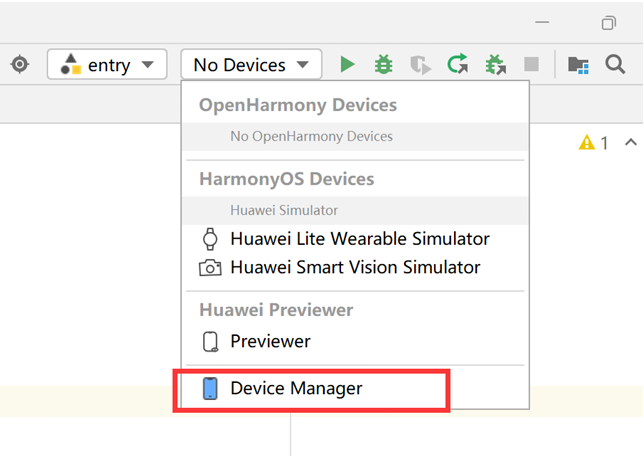 创建模拟器“New Emulator”
创建模拟器“New Emulator” 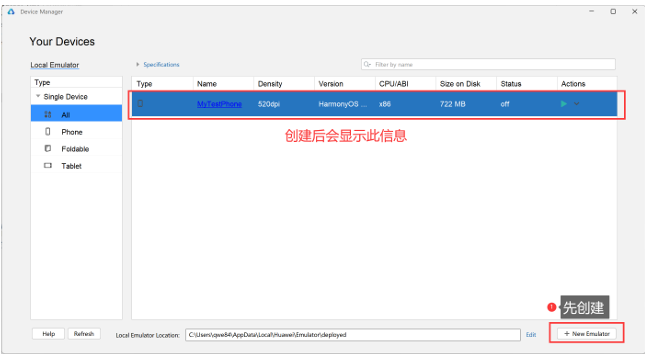 下载目标虚拟机的包
下载目标虚拟机的包 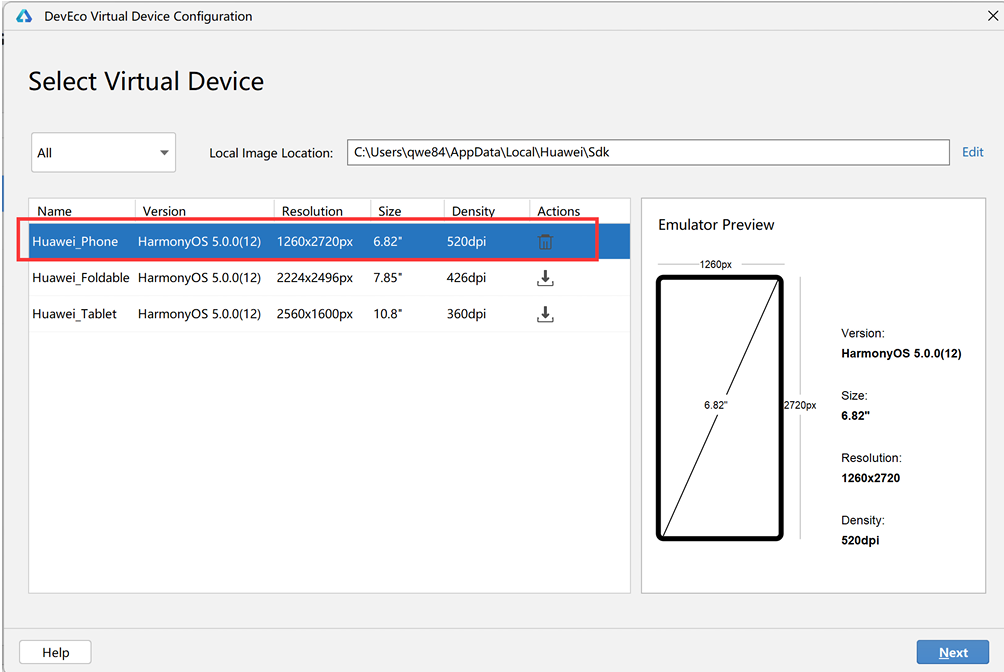
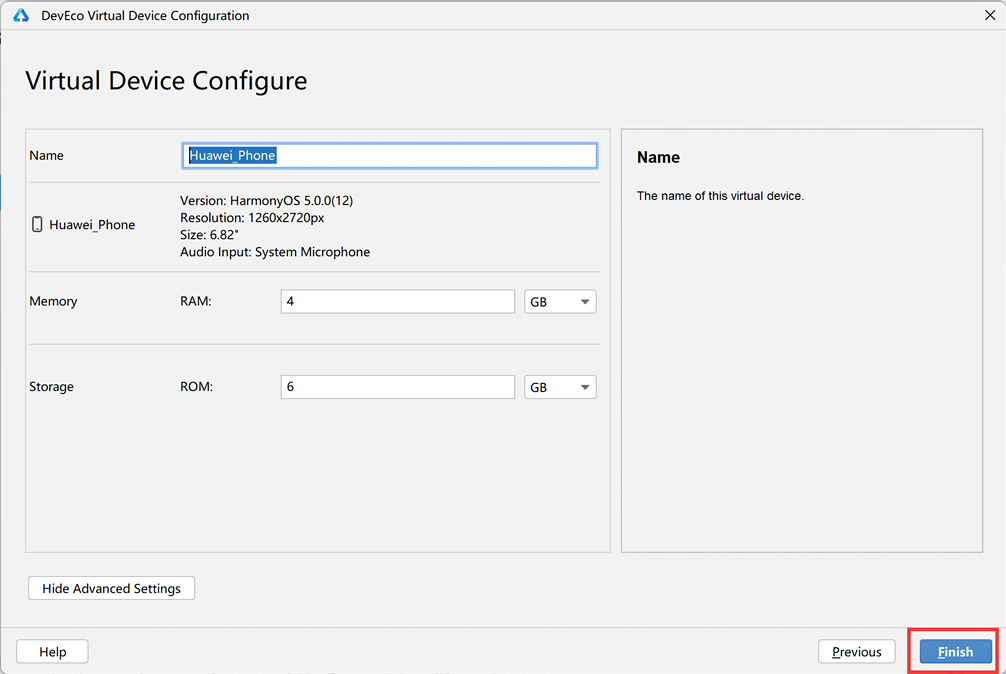
启动虚拟机
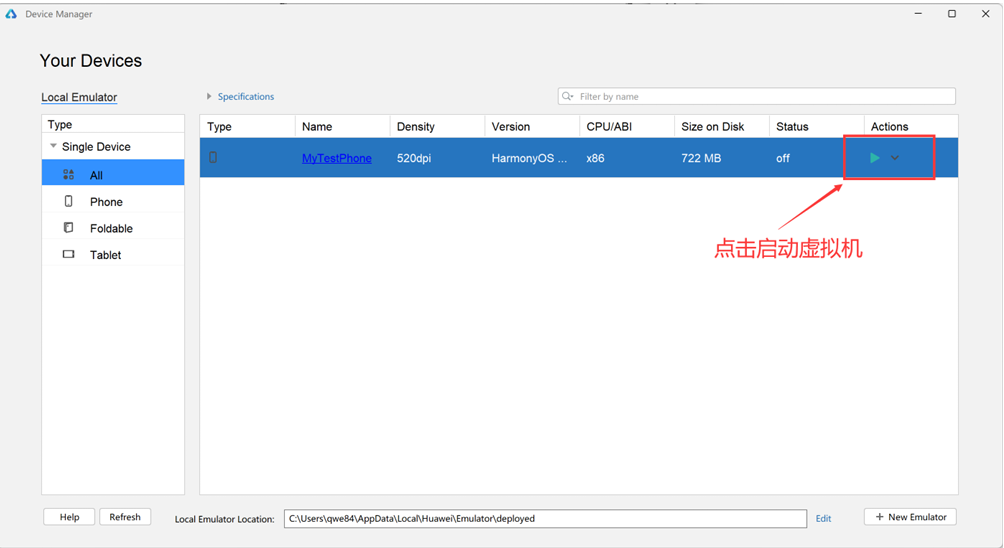
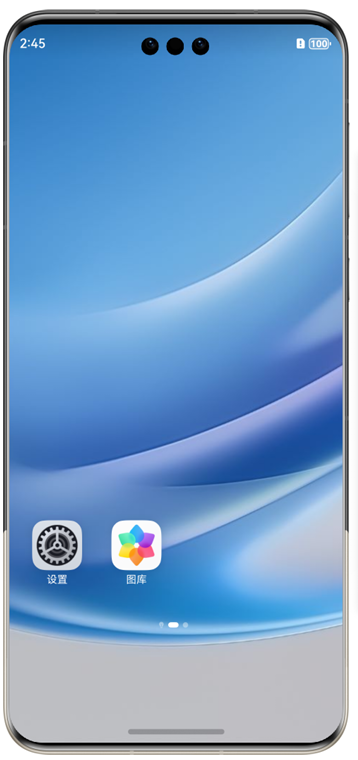
最终效果
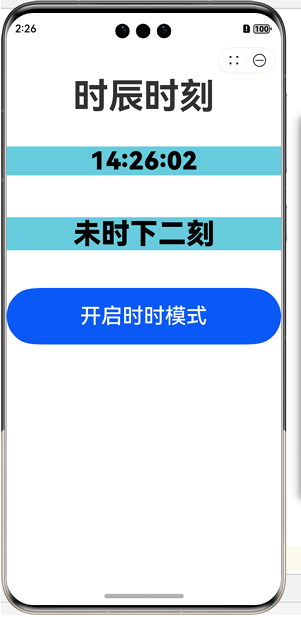
6、新建元服务卡片
操作顺序:File>New > Service Widget > Dynamic Widget
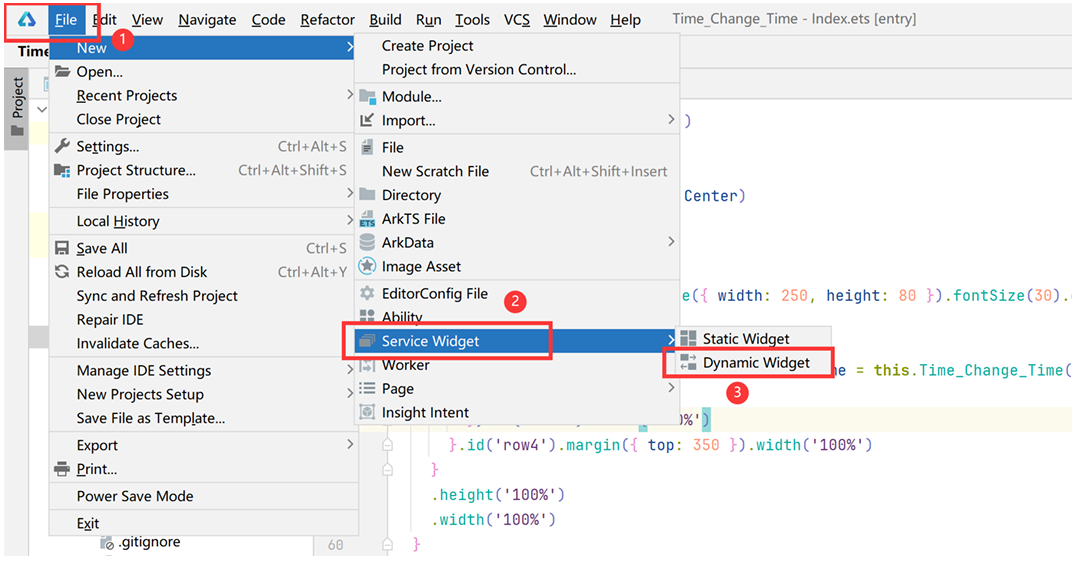
- Service widget name:卡片的名称,在同一个应用/服务中,卡片名称不能重复,且只能包含大小写字母、数字和下划线。
- Display name:卡片预览面板上显示的卡片名称。仅API 11 及以上Stage工程支持配置该字段。
- Description:卡片的描述信息。
- Language:界面开发语言,可选择创建ArkTS/JS卡片,不支持JS卡片。
- Support dimension:选择卡片的规格。部分卡片支持同时设置多种规格。首次创建服务卡片时,将默认生成一个EntryCard目录,用于存放卡片快照。
- Default dimension:在下拉框中可选择默认的卡片。
- Ability name:选择一个挂靠服务卡片的Form Ability,或者创建一个新的Form Ability。
- Module name:卡片所属的模块。
7、元服务卡片编码
页面地址:src/main/ets/widget/pages/WidgetCard.ets
@Entry
@Component
struct WidgetCard {
readonly message: string = '时辰时刻';
formatTime(timeStr: string): string {
let timeParts = timeStr.split(':');
let formattedParts = timeParts.map((part) => {
let num = parseInt(part);
return num < 10 ? `0${num}` : `${num}`;
});
return formattedParts.join(':');
}
@State base_time: Date = new Date(Date.now());
@State str_time: string =
this.formatTime(this.base_time.getHours().toString() + ":" +
this.base_time.getMinutes() + ":" +
this.base_time.getSeconds());
@State show_change_time: string = this.getShiChen(this.base_time.getHours(),
this.base_time.getMinutes());
@State isf: boolean = true;
build() {
RelativeContainer() {
Row() {
Text(this.message)
.id('shiChenShiKe')
.fontSize(50)
.fontWeight(FontWeight.Bold)
.alignRules({
center: { anchor: '__container__', align: VerticalAlign.Center },
middle: { anchor: '__container__', align: HorizontalAlign.Center }
})
}.id('row1').margin({ top: 50
}).justifyContent(FlexAlign.Center).width('100%')
Row() {
Text(this.str_time).fontSize(35).fontColor(Color.Black).fontWeight(FontWeight.Bo
lder)
}
.backgroundColor('#66CCDD')
.id('row2')
.margin({ top: 115 })
.justifyContent(FlexAlign.Center)
.width('100%')
Row() {
Text(this.show_change_time).fontSize(40).fontColor(Color.Black).fontWeight(FontW
eight.Bolder)
}
.backgroundColor('#66CCDD')
.id('row3')
.margin({ top: 150 })
.justifyContent(FlexAlign.Center)
.width('100%')
Row() {
Button('更新时间')
.size({ width: 250, height: 80 })
.fontSize(30)
.onClick(() => {
this.show_change_time = this.Time_Change_Time();
})
.id("btn1")
.width('100%')
}.id('row4').margin({ top: 220 }).width('100%')
}
.height('100%')
.width('100%')
}
Time_Change_Time(): string {
let timeInMs = Date.now();
let dateObj = new Date(timeInMs);
this.str_time = this.formatTime(dateObj.getHours() + ":" +
dateObj.getMinutes() + ":" + dateObj.getSeconds());
return this.getShiChen(dateObj.getHours(), dateObj.getMinutes());
}
convertToChineseTimes(hour: number): string {
if (23 <= hour || hour < 1) {
return "子时";
} else if (1 <= hour && hour < 3) {
return "丑时";
} else if (3 <= hour && hour < 5) {
return "寅时";
} else if (5 <= hour && hour < 7) {
return "卯时";
} else if (7 <= hour && hour < 9) {
return "辰时";
} else if (9 <= hour && hour < 11) {
return "巳时";
} else if (11 <= hour && hour < 13) {
return "午时";
} else if (13 <= hour && hour < 15) {
return "未时";
} else if (15 <= hour && hour < 17) {
return "申时";
} else if (17 <= hour && hour < 19) {
return "酉时";
} else if (19 <= hour && hour < 21) {
return "戌时";
} else {
return "亥时";
}
}
convertToChineseTime(hour: number, minute: number): string {
let chineseHour = this.convertToChineseTimes(hour);
let minuteMark = hour % 2 !== 0 ? "上" : "下";
if (minute < 15) {
minuteMark += "一刻";
} else if (minute < 30) {
minuteMark += "二刻";
} else if (minute < 45) {
minuteMark += "三刻";
} else {
minuteMark += "四刻";
}
return `${chineseHour}${minuteMark}`;
}
getShiChen(hour: number, minute: number): string {
return this.convertToChineseTime(hour, minute);
}
}
效果:
